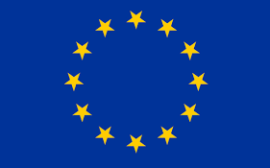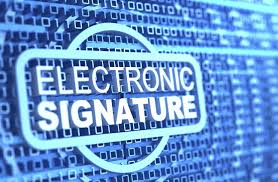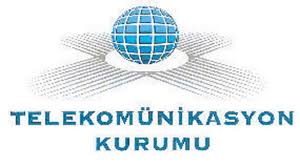ve E-Mühür
Toplam doküman Sayısı: 119

AVRUPA BİRLİĞİ ELEKTRONİK İMZA MEVZUATI
- 2014/910/EC İç Pazarda Elektronik İşlemler için Güven Servisleri ve Elektronik Doğrulama Direktifi - eIDAS
(electronic identification and trust services for electronic transactions in the internal market and repealing Directive 1999/93/EC)
* eIDAS Web Sayfası
- 2015/296/EU e-ID İşbirliği Direktifi
(establishing procedural arrangements for cooperation between Member States on electronic identification pursuant to Article 12(7) of Regulation (EU) No 910/2014 of the European Parliament and of the Council on electronic identification and trust services for electronic transactions in the internal market)
- 2015/806/EUNitelikli Güven Servisleri için Güven İşareti
(laying down specifications relating to the form of the EU trust mark for qualified trust services)
- 2015/1501/EU e-ID Birlikte Çalışabilirlik Çerçevesi
(the interoperability framework pursuant to Article 12(8) of Regulation (EU) No 910/2014 of the European Parliament and of the Council on electronic identification and trust services for electronic transactions in the internal market)
- 2015/1502/EU e-ID Güvence Seviyeleri
(setting out minimum technical specifications and procedures for assurance levels for electronic identification means pursuant to Article 8(3) of Regulation (EU) No 910/2014 of the European Parliament and of the Council on electronic identification and trust services for electronic transactions in the internal market)
- 2015/1505/EU Güvenilir Liste
(laying down technical specifications and formats relating to trusted lists pursuant to Article 22(5) of Regulation (EU) No 910/2014 of the European Parliament and of the Council on electronic identification and trust services for electronic transactions in the internal market )
- 2015/1506/EU AdES (Gelişmiş e-İmza ve e-Mühür) Formatları
(laying down specifications relating to formats of advanced electronic signatures and advanced seals to be recognised by public sector bodies pursuant to Articles 27(5) and 37(5) of Regulation (EU) No 910/2014 of the European Parliament and of the Council on electronic identification and trust services for electronic transactions in the internal market)
- 2015/1984/EU eID Bildirimi
(defining the circumstances, formats and procedures of notification pursuant to Article 9(5) of Regulation (EU) No 910/2014 of the European Parliament and of the Council on electronic identification and trust services for electronic transactions in the internal market)
- 2016/650/EU QSCD (Nitelikli İmza ve Mühür Üretim Cihazları) Güvenlik Değerlendirmesi
(laying down standards for the security assessment of qualified signature and seal creation devices pursuant to Articles 30(3) and 39(2) of Regulation (EU) No 910/2014 of the European Parliament and of the Council on electronic identification and trust services for electronic transactions in the internal market)

E-İMZA KONUSUNDA ÜLKEMİZDEKİ BİLİŞİM MEVZUATI

ÜLKELERİN ELEKTRONİK İMZA MEVZUATI
ve ULUSLARARASI REHBERLER

AVRUPA BİRLİĞİ (ÜYE ve ADAY) ÜLKELERİ
ELEKTRONİK İMZA MEVZUATI

Austria
Signature and Trust Service Act (SVG)
The new Signature and Trust Service Act (SVG) implements Regulation (EU) No 910/2014 on electronic identification and trust services for electronic transactions in the internal market and repealing Directive 1999/93/EC, OJ No L 257/73 of 28 August 2014, with the exception of its Chapter II. Trust services within the meaning of this Federal Act are electronic services normally provided against a fee and consisting of the elements in Article 3(16) of this Regulation, in particular electronic signatures, seals, time stamps, registered delivery services, website authentication and their certificates insofar as these services come within the scope of this Regulation. The Signature and Trust Service Act replaces the Electronic Signature Act.

Belgium
Law on the use of Electronic Signature in Judicial and Extra-Judicial Proceedings (2000)
This law of 20 October 2000 introduced the use of the electronic signature within judicial and extra-judicial proceedings. It has been the first law to address the eSignature issue in Belgium. The law was lastly amended in September 2006.
eSignature Act (2001) and Legal Framework on Electronic Identification (2001)
Adopted on 9 July 2001, the ‘eSignature Act’ transposes into Belgian Law the EU Directive 1999/93/EC on a Community framework for electronic signatures. It gives legal value to electronic signatures and electronically signed documents while setting up a legal framework for certification services. It is worth mentioning that on a regional level, a law on electronic forms signed with the eID card of December 2006 and two related decrees of July 2008 have been adopted by the Walloon Parliament and the Walloon Government respectively. These decrees give the same legal value to electronic forms as those of paper forms. Moreover, the legal framework for the use of electronic identity cards is set in a series of Royal and Ministerial Decrees, namely: the Royal Decree of 25 March 2003 on the legal framework of electronic ID cards, the Ministerial Decree on the format of electronic ID cards of 26 March 2003, the Royal Decree on the generalisation of electronic ID cards of 1 September 2004 and Royal Decree on the eID document for Belgian children under 12 of 18 October 2006.

Bulgaria
Bill amending the Law on Electronic Document and Electronic Signature (2016)
Bulgaria recently amended the Law on Electronic Document and Electronic Signature to:
- Create the conditions for a comprehensive cross-border and inter-sector framework for secure, reliable and easy to use electronic transactions in the internal market;
- Create the conditions to develop digital infrastructure, to improve the quality of public services, which would facilitate cross-border access to businesses and citizens within the European Union - and with the other leading countries in the field of eGovernment;
- Ensure a fruitful European collaboration promoting innovation and the exchange best practices to the implementation of cross-border electronic services, and synchronisation with European initiatives and programmes relating to eGovernment;
- Build trust in the online environment, which is a key factor for economic and social development. A lack of confidence in the online environment discourages citizens and public authorities from carrying out electronic transactions and electronic service delivery.
The amendments to the Law on Electronic Document and Electronic Signature aimed to ensure that national legislation relating to the provision of electronic certification services complies with European legislation and in particular Regulation (EC) № 910/2014 of the European Parliament and the Council from July 23, 2014 on the electronic identification and trust services for electronic transactions in the internal market, repealing Directive 1999/93/EC (Commission Regulation (EU) № 910/2014). In view of the direct applicability of the regulation, it provides for the repeal of the provisions relating to elements of the system that are specifically regulated by the act of the European Union. The law has passed the commissions within the National Assembly and the first reading. The procedure for its adoption will continue at second reading.
Law on Electronic Document and Electronic Signature (2011)
A Working group at the Ministry for Transport, Information Technology and Communications has drawn up a draft Act amending and supplementing the Act on electronic document and electronic signature in accordance with Regulation 910/2014, which was published for public consultation.
An amendment to the Law on Electronic Document and Electronic Signature (EDESA) was published on 21 December 2010 and entered into force on 1 July 2011. Its purpose is to make the Law fully compliant with the requirements of the EU Directive on a Community framework for electronic signatures (1999/93/EC), as amended by Regulation (EU) No 910/2014. It regulates electronic documents and electronic signatures, as well as terms and procedures for providing certification services.
Following the entry into force, a qualified electronic signature has the legal effect of a handwritten signature, while simple and advanced electronic signatures may be recognised as handwritten signatures.
Article 31 of the eGovernment Act regulates the use of eSignature for eGovernment applications. Specifically, the regulations for acquisition, use, renewal and withdrawal of electronic signature certificates in the administrations shall be laid down in a Council of Ministers ordinance.

Croatia
Electronic Signature Act (NN 10/02 and NN 80/08 and NN 30/14)
Croatia was one of the first countries to include digital signatures in its legislation. The Electronic Signature Act (Law NN 10/02, amended by Law NN 80/08) has been supplemented by a series of ordinances and regulations, such as the Regulation on the scope of operations, content and responsible authority for operations of electronic signature certification for State Administration bodies (NN 146/04).

Cyprus
Legal Framework for Electronic Signatures and Associated Matters (2004)
By decision of the Council of Ministers in March 2008, the Department of Electronic Communications (DEC) was assigned the legal framework of Electronic Signatures. DEC, as the competent authority for the implementation of electronic signature framework in Cyprus, decided to modify the existing law governing Electronic Signatures (No. 188 (I) / 2004), which entered into force on 30 April 2012 (N. 86 (I) 2012). The amending Act was intended to better align with the provisions of Directive 1999/93 / EC and to establish a more solid legal framework for the use and legal recognition of Electronic Signatures. In addition, the Department has issued in 2013 the Electronic Signatures Regulations (ΚΔΠ 267/2013). The Regulations defined the issuing procedures of the qualified certificates to be delivered by the Certification Service Providers.
On 1 July 2016 came in force Regulation (EU) No. 910/2014 which replaces the previous Directive for Electronic Signatures 1999/93/EC. It also introduces new regulatory procedures for a number of new trust services e.g. electronic seals, electronic time stamps, electronic registered delivery services etc. To this end, the Department of Electronic Communications (DEC) has prepared a new legislation that adopts all new provisions under the above Regulation. Also, this legislation sets DEC as the Competent Authority for the implementation of Regulation (EU) No. 910/2014, as the Supervisory Body under (Article 17 of the Regulation) and the body responsible for keeping the national trusted list (Article 22 of Regulation).

Czech Republic
The Act no. 297/2016 Coll., on trust services for electronic transactions, brings the Czech Republic closer to implementation of the eIDAS regulation. According to this Act, the Ministry of Interior fulfils the tasks of a supervisory body over qualified trust service providers. Two related pieces of national legislation, namely the Act on electronic identification and the amendment of the Act on identity card, are in the process of preparation.
Act on Electronic Signatures (2000)
The Electronic Signatures Act (No. 227/2000) was adopted on 29 June 2000 and amended several times, with the latest amendment taking place in 2012. Together with several ordinances, this Act transposes the EU Directive on a Community framework for electronic signatures (1999/93/EC) and amends several provisions of the Civil Code, so as to expressly provide a legal value to electronic signatures. The Act provides a definition of an electronic signature and introduces a system of qualified electronic signatures and accredited qualification service providers issuing qualified certificates, qualified system certificates and qualified time stamp tokens. It stipulates that only certified electronic signatures and qualified certificates issued by accredited providers of certification services can be used for electronically exchanging information with public authorities.
Act on Electronic Actions and Authorised Document Conversion (2009, last amendment: 2012)
The Act on Electronic Actions and Authorised Document Conversion (300/2008 Coll.) entered into force on 1 July 2009 and was last amended in 2012. It lays down the provisions for the use of certified eSignatures. It states that each eDocument has to bear a guaranteed eSignature. The entire data box system (the Information System of Data Boxes) shall work in a secure and guaranteed method. Any messages sent from a data box shall be provided with a time stamp and electronic mark (which is analogous to a guaranteed electronic signature), with all attachments time-stamped and marked accordingly. For activities carried out with public authorities, this eSignature is equal in all respects to that of a hand-written alternative in certifying official documents.

Denmark
Act on Electronic Signature (2000)
This Act entered into force in October 2000, implementing the EU Directive on a Community Framework for Electronic Signatures (1999/93/EC). The definitions of advanced and 'qualified' electronic signature under the Danish law are very close to those of the European Directive. Advanced and 'qualified' electronic signatures cannot be issued to legal entities under the Danish law. The Danish Government has set up an official digital signature scheme (NemID), whereby all citizens are due to receiving a free software-based digital signature (OCES - Public Certificate for Electronic Services) providing sufficient security for most public and private sector transactions.

Estonia
Electronic Identification and Trust Services for Electronic Transactions Act (2016)
The new Electronic Identification and Trust Services for Electronic Transactions Act adopted on 12 October 2016, constitutes the effective transposition of the EU’s eIdas regulation. This act replaces the Digital Signatures Act (DSA), entered into force on 15 December 2000 and was revised in 2014. The DSA gave digital and handwritten signatures equal legal value and sets an obligation for all public institutions to accept digitally signed documents.

Finland
Act on Strong Electronic Identification and Trust Services (2009, amend. 2017)
The Act on Strong Electronic Identification and Electronic Signatures entered into force on 1 September 2009. It has been amended by including rules on network of identification services and adapting national legislation to align with the requirements of the EU legislation on electronic identification and trust services. The amendments on network of identification services shall be applicable from May 2017. The Act on Strong Electronic Identification and Trust Services (2009) is founded on the principle that users must be able to trust information security and protection of privacy when using electronic identification services. The Act's objective is to create common rules for the provision of sound electronic identification services, and to promote the provision of identification services and the use of trust services.

France
Law on Electronic Signature (2000)
The Law of 13 March 2000 grants legal value to electronic signatures and electronically-signed documents, and further implements the EU Directive 1999/93/EC on a Community framework for electronic signatures. This law was complemented by an application decree issued on 30 March 2001.

Macedonia
Law on Data in Electronic Form and Electronic Signature (2001)
The law of 2001 concerns electronic operations which involve the use of ICT, as well as that of electronic data and signatures in judicial, administrative and commercial transactional procedures. According to Article 13, "the generally accepted electronic signature with an authorised certificate related to the electronic data is equal to the personal signature, and therefore shall be of equally valid evidence with the personal signature which is related to paper documents" 15 . However, this article further provides that "the electronic signature shall not be valid when a personal signature is required in writing before a public notary or a court."
The law was followed by four bylaws in 2001 and its actual use started in 2007 after the issuance of the fifth bylaw which regulates the institutions that can act as certification authorities (Official Gazette No. 34/2001, 06/2002 and 98/2008). The entire body of legislation also regulates the process of using electronic messages such as like timestamps, system identifiers and others.
Further amendments to the law were made in 2015, when Ministry of information society and administration became an institution in charge of registering Certificate Authorities (CAs) on national level, while the Agency for electronic communication became official body for the accreditation of CAs.

Germany
Digital Signature Act (2001)
The German Electronic Signature Act came into force on 22 May 2001, implementing EU Directive 1999/93/EC on a Community framework for electronic signatures and replacing the previous Digital Signature Act that had been adopted as part of the Information and Communication Services Act of 1 August 1997. It regulates the necessary secure infrastructure for the use of electronic signatures, which receive the same legal status as hand-written signatures. It is complemented by an Ordinance on Electronic Signatures of 16 November 2001 setting out standard requirements and responsibilities for certification authorities, as well as minimum requirements for technical components used to create digital signatures. The Digital Signature Act has been amended by the First law amending the Signature Act (1. SigÄndG) of 04/01/2005.

Greece
This presidential decree came into effect on 25 June 2001 and implements the European Directive 1999/93/EC of 13 December 1999 on a Community framework for electronic signatures. It defines electronic signatures and advanced electronic signatures. It also deals with: the legal consequences of electronic signatures, the liability of suppliers of certification, the obligation to protect personal information, terms in effect for recognised certificates and suppliers, assurance of the liability of the creation of a signature and recommendations for the verification of the signature.

Hungary
Act No. CCXXII. of 2015. on General Rules of Electronic Administration and Trust Services
The new act adopted on 3 January 2016 and entered into force on 29 June 2016, sets out the general rules on electronic signatures. The act was adopted to introduce the legal provisions necessary to implement the eIDAS regulation (910/2014/EU), as well as the rules of authenticity of electronic and paper-based documents. The new act effectively repeals previous legislation on electronic signatures.

Iceland
Regulation No. 780/2011 on Electronic Signatures
This regulation applies to the information to be included in qualified certificates, requirements of certification service providers who issue qualified certificates, requirements for secure signature creation devices, the mechanism for the registration, notifications and disclosures of certification service providers and the mechanisms of regulation of certification service providers issuing qualified certificates.
An electronic signature made using a qualified certificate does not constitute confirmation of the time of signature creation.
Act on Electronic Signatures, No. 28/2001
Based on a similar EC Directive, article 4 of the Act stipulates that fully qualified electronic signatures shall have the same force as handwritten signatures. Furthermore, it is stipulated that other electronic signatures can be legally binding. Supporting legislation comes through the Electronic Commerce Act, 2002 and the Administrative Procedures Act, as amended in 2003.

Ireland
Electronic Commerce Act (2000)
The Electronic Commerce Act 2000, which became law on 20 September 2000, implements the EU Directive on a Community framework for electronic signatures (1999/93/EC). The Act provides (with some exceptions) for the legal recognition of electronic signatures, electronic writing and electronic contracts. It authorises the use of encryption and sets the rights and obligations of Certification Service Providers (CSPs).

Italy
Legislative Decree n. 10 on Electronic Signatures (2002)
Italy has been among the first EU countries to give full legal value to electronic signatures. Law n. 59 of 15 March 1997 on the simplification of the Public Administration provided in its article 15 that the use of electronic means would be legally valid for administrative procedures. Rules regarding the use of electronic signatures and documents were further detailed in a series of presidential and government decrees adopted between 1997 and 2001. Legislative Decree no. 10 of 23 January 2002 brought the Italian electronic signature regulations in line with the Directive 1999/93/EC on a Community framework for electronic signatures.
eGovernment Code (2005)
The eGovernment Code regulates electronic signatures and confirms their full legal validity. The Italian known as 'firma digitale' (digital signature) is compliant with the 'qualified signature', as in the Directive 1999/93/EC.

Latvia
Electronic Documents Law (2003)
The Electronic Documents Law came into force on 1 January 2003. The Law transposes the EU Directive on a Community framework for electronic signatures (1999/93/EC), and defines the legal status of electronic documents and digital signatures. According to the Law, electronic documents have to be accepted by every public institution (state and municipal). In addition, citizens and businesses can request an electronic reply from the Public Administration.
Amendments of Electronic Document Law (EDL) (2015)
The legislation is intended to ensure the wider use of a secure electronic signature. Legislation extending the use of a secure electronic signature, which excludes the pre-established limits the use of electronic documents (such as a private business or expedited family law). At the same time it is expected that the EDL regulation is applied where the sectoral laws and regulations do not cover it otherwise. Thus, if the normative act will be tolerated in electronic form of use, then it will have to be applicable to the EDL. Legislative act simplifies the procedure for re-securing the electronic signature for receipt as well as clarifies the information to be included in the qualified certificate.

Liechtenstein
The current legislation on eSignatures (Signaturgesetz; SigG, registry number 784.11) has been in force since September 2003. Among other, the law implements the European Directive 1999/93/EC on a Community framework for Electronic Signatures. It has beensupplemented by the regulation on Electronic Signatures of June 2004 (SigV, registry number 784.111).

Lithuania
Law on Electronic Signature (2000)
Passed on 11 July 2000, the law regulates the creation, verification and validity of electronic signatures, the rights and obligations of signature users, the requirements for certification services and certification service providers, as well as the rights and functions of the institution of electronic signature supervision.
It is compliant with the EU Directive on a 'Community framework for electronic signatures' (1999/93/EC). The concept of a 'secure eSignature' stated in Lithuanian law is identical to the notion of an 'advanced eSignature' referred to in the Directive. An amendment to the law on electronic signature was adopted in 2002, which establishes that, in all cases, an electronic signature shall have the legal power of a hand-written signature, provided that the signature users reach an agreement among themselves. In this way, the notion of a 'contractual electronic signature' was introduced in Lithuanian law. eSignature is also admissible as evidence before a court of law. The law does not include any specific requirements for the use of electronic signatures in the public sector.
Law on Identity Cards of the Republic of Lithuania (2001)
Adopted in 2001, the law regulates the purpose of the ID card, procedures for its issuance, change and usage, as well as the data to be recorded on it. The law was amended in June 2008 with reference to the fact that the personal identity card shall be used for electronic personal identification and for signing electronic documents.

Luxembourg
eCommerce Act (2000)
The eCommerce Act of 14 August, 2000, complemented by a regulation of 1 June, 2001 on electronic signatures and electronic payments, transposes the EU Directive on Electronic Signatures (1999/93/EC).
The eCommerce Act explicitly mentions two types of eSignatures: 1) a basic type, which consists of a "set of data which is linked to the deed in a non-dissociable way and warrants the integrity of the deed […] The electronic signature must also ensure the signatory is identified and show the latter's obvious consent to the content of the deed", and 2) an eSignature "supported by a qualified certificate, which must be created with a secure signature creation device under the sole control of the subscriber".
Certification service providers can only issue certificates with the approval of the National Accreditation and Supervision Authority. Approved (qualified) certificates are valid for a maximum duration of 3 years and must be archived by the certification service provider for at least 10 years. Also, the certification providers have to submit to periodic external security audits.
eSignatures supported by a qualified certificate have the same legal validity as a handwritten signature, and the eCommerce Act has rendered void all laws and regulations that challenged the validity of a contract because it was electronically signed.

Malta
eCommerce Act (2000)
The eCommerce Act of 14 August, 2000, complemented by a regulation of 1 June, 2001 on electronic signatures and electronic payments, transposes the EU Directive on Electronic Signatures (1999/93/EC).
The eCommerce Act explicitly mentions two types of eSignatures: 1) a basic type, which consists of a "set of data which is linked to the deed in a non-dissociable way and warrants the integrity of the deed […] The electronic signature must also ensure the signatory is identified and show the latter's obvious consent to the content of the deed", and 2) an eSignature "supported by a qualified certificate, which must be created with a secure signature creation device under the sole control of the subscriber".
Certification service providers can only issue certificates with the approval of the National Accreditation and Supervision Authority. Approved (qualified) certificates are valid for a maximum duration of 3 years and must be archived by the certification service provider for at least 10 years. Also, the certification providers have to submit to periodic external security audits.
eSignatures supported by a qualified certificate have the same legal validity as a handwritten signature, and the eCommerce Act has rendered void all laws and regulations that challenged the validity of a contract because it was electronically signed.

Netherlands
The Electronic Signature Act
The Electronic Signature Act was published on 8 May 2003 and became effective on 21 May 2003. The act ensures the transposition in Dutch law of the European Directive 1999/93/EC on a Community framework for electronic signatures. The Regulation electronic identification and trusted services (EU/910/2014), known as the eIDAS regulation, repeals the Directive from 2003. National eIDAS implementation act has passed both Chambers of Parliament in December 2016. The act implements parts of the eIDAS regulation, by means of changes in existing Dutch laws, like Telecommunications law, Civil Law and General Administrative Law.

Norway
Electronic Signature Act (2001)
Act No. 81 of 15 June 2001 relating to electronic signature (Electronic Signature Act) contains detailed provisions for electronic identification of persons and gives qualified electronic signatures equal status to traditional signatures for administrative purposes. The Act, lastly updated on 17 June 2005, implements the relevant Directive 1999/93/EC.

Poland
Act on Trust Services and Electronic Identification (2016)
The act was adopted pursuant to Regulation (EU) No 910/2014 of the European Parliament and of the Council of 23 July 2014 on electronic identification and trust services for electronic transactions in the internal market (the eIDAS Regulation), which repeals Directive 1999/93/EC. This law will make it possible for those who have electronic signature to use e-Administration services in any given EU country. It repealed the earlier functioning Act on Electronic Signature, adopted in 2001.

Portugal
Decree-Law on Electronic Signatures
The Decree-Law on Electronic Signatures no. 62 of 3 April 2003 aims to align the legal regime for digital signatures established in a previous Decree-Law (Decree-Law no. 290-D/99) to Directive 1999/93/EC on a Community framework for electronic signatures. The Decree-Law no. 165/2004, of 6 July and the Regulatory Decree no. 25/2004 of 15 July constitute further legislation in this area.
Law on Citizen Cards
The Law no. 7/2007 of 5 February 2007 created the Citizen's Card and regulates its issuance, replacement, use and cancellation. Article 18 lays down the provisions for digital certificates, an electronic document which uses a digital signature. They include, among others: an eSignature based on a qualified certificate is optional; it can only be activated and used by citizens over the age of 16; no eSignature based on a related qualified certificate can be activated, if a holder requesting a Citizen's Card is deemed unsuitable.
eSignature based on a qualified certificate
The provisions of Decree-Law no. 290-D/99, Decree-Law no. 165/2004, Decree-Law no. 62/2003 and Decree-Law no. 116-A/2006 shall apply to an eSignature based on a qualified certificate, while these certificates are subject to the applicable rules and regulations pertaining to the State Electronic Certification System (SECS) (http://www.scee.gov.pt/ ).
Law no. 37/2014, of 26 June 2014 establishes an alternative and voluntary authentication system of citizens in portals and websites of the Public Administration, the Digital Mobile Key.

Romania
Law no. 455/2001 on Electronic Signature
The Law grants to eSignature the same legal status of a written signature. This effectively places electronic and printed data on an equal footing and allows electronic data to be admitted as evidence in court in the event of a dispute. The Ministry of Communications and Information Society (MCSI) is the authority in charge of eSignature regulation. By Order no. 54 of the Minister of Communications and Information Society, the procedure for approving, delaying and recalling the decision of accreditation of the certification services providers is also defined (OJ no. 209/11.03.2005).
Law no. 589/2004 on the legal status of electronic notary work
Passed on 15 December 2004, this law establishes the legal regime applied on electronic notarial acts. It presupposes that notary documents shall come in an electronic form, be signed by the notary public's electronic signature and be handled by the notary public. This Law has been supplemented in June 2009 by Order no. 500/2009 issued by the Ministry of Communications and Information Technology, which clarified all technical and methodological applications.

Slovakia
Act No. 215/2002 on Electronic Signatures has been repealed by Act No. 272/2016 on trust services for electronic transactions in the internal market based on Regulation no 910/2014 of the European Parliament and of the Council of 23 July 2014 on electronic identification and trust services for electronic transactions in the internal market. It regulated relations arising in connection to the creation and use of electronic signatures and electronic seals, the rights and obligations of persons and legal persons when using electronic signatures and electronic seals and the reliability and protection of electronic documents signed by electronic signatures or provided by electronic seals.

Slovenia
Act amending the Electronic Commerce and Electronic Signature Act (2004)
The initial version of the Electronic Commerce and Electronic Signature Act (ZEPEP) was adopted on 13 June 2000 and came into force on 22 August 2000. Act no. 215/2002 on eSignature regulated creation, usage, rights and obligations of corporate entities and individuals, as well as trustworthiness and protection of digitally signed eDocuments. The Acttransposed the notions of 'advanced' and 'qualified' electronic signature of Directive 1999/93/EC of 13 December 1999. Devices for secure electronic signing should comply with specific conditions regarding security and reliability, specified in a number of decrees collectively referred to as Implementing Regulations to the Act, in force since April 2009. eSignatures for internal government applications must be secured by qualified certificates issued by one of the Certification Authorities at the Ministry of Public Administration, while the National Security Authority (NSA) is the central state body administering electronic signatures.
The act amending the Electronic Commerce and Electronic Signature Act was adopted in April 2004, defined the responsibilities of providers of IT services in a more precise way and set the conditions for the realisation of the electronic identity card project. Later Act amending was adopted in April 2014.

Spain
Law 59/2003 of 19 December on electronic signature replaced a Royal Decree of 1999 on digital signatures. Aimed at promoting a widespread use of digital signatures for eGovernment and eCommerce, it transposed the EU Directive 1999/93/EC on a Community framework for electronic signatures into Spanish law. Amongst other provisions, the law clarifies relevant concepts and terminology, introduces a digital signature for legal entities, promotes certification industry self-regulation and establishes a legal framework for the development of a national electronic ID card. This law was last modified on 1 st October 2015.
In addition, Royal decree 1553/2005 of 23 December regulates the issuance of the national ID document and its eSignature certificates. Their Royal Decree was modified by the Royal Decree 869/2013 of 8 November, amending Royal Decree 1553/2005 of 23 December on the issue of national identity and electronic signature certificates.
Law 40/2015 on the Legal Regime of the Public Sector
Articles 42 and 43 of Law 40/2015 on the Legal Regime of the Public Sector regulates the use of digital signature methods by public administrations. Article 45 imposes requirements for the interoperability of electronic signatures not based on electronic certificates.
Law 39/2015 on the Common Administrative Procedure Public Administration
Article 10 of the Law 39/2015 on the Common Administrative Procedure Public Administration regulates the use of digital signature methods by citizens and business in their relationships with the Public Administrations.
Royal Decree 4/2010, National Interoperability Framework
The Technical Standard for Interoperability (TSI) of Governmental Electronic Signature and Certification Policy has been elaborated within the National Interoperability Framework. TSI establishes a series of criteria applied by Public Administrations in relation to the authentication and mutual recognition of certificate-based electronic signatures which will be developed and consolidated through certificate-based electronic signature policies.
Technical Interoperability Norm of Policy of Signature, electronic Stamp and of
Administration’s Certificates
The National Interoperability Framework is established in the article 156 of Law 40/2015, of 1 October 2015, on Legal Regime of the Public Sector. The aim of this framework is the creation of the necessary conditions to guarantee the adequate level of interoperability regarding the technical, semantic and organisational aspects of the systems and applications used by Public Administrations that allow the exertion of rights and fulfilment of duties through digital access.
The Technical Interoperability Agreement of Policy of Signature, Digital Stamp and of Administration’s Certificates from 26 October 2016, replaces the previous named Policy of electronic signature and Administration’s certificates. It establishes the set of criteria used for the development or adoption of signature and electronic stamp’s policies based on Public Administration’s certificates. It defines the content needed in the creation of a policy of electronic signature and stamp based on certificates and specifying the characteristics of the common rules such as formats and algorithms used.
The conditions established in this agreement aim to set a framework for the definition of the electronic signature and stamp based on certificates that are aligned with recent European acts such as the Execution Decision (EU) 2015/1506 from the Commission on 8 September 2015.eSignature Policy of the General State Administration
In November 2012, the eSignature Policy of the General State Administration was approved by means of the Resolution of 29 November 2012, of the Ministry of Public Administration, for which the agreement of approval of the eSignature and certificates policy of the General State Administration is published and advertised.

Sweden
Act on Qualified Electronic Signature (2001)
This Act, which implements the EU Directive on a Community framework for electronic signatures (1999/93/EC), entered into force on 1 January 2001. The Swedish electronic signature includes authentication and integrity requirements. According to the Act’s definition of qualified electronic signatures, there are only certain certification authorities (“CAs”) that may provide such signatures. The Act states that when a law or regulation contains requirements for a hand-written signature and if such signature is satisfied by electronic means, a qualified signature shall then fulfil this requirement.

Switzerland
Federal Law on Certification Services in the Area of Electronic Signature (2003)
The Law, which came into force on 1 January 2005, defines the conditions under which providers of certification services can be recognised on a voluntary basis, and regulates their activities in the field of electronic certificates. It also lays down the requirements that must be fulfilled by an electronic signature to achieve the same status as its hand-written alternative. Additionally, it regulates the question of responsibility on the part of the certification service providers, approving bodies and the owners of signature keys.
The law is supplemented by regulatory provisions: (https://www.admin.ch/opc/fr/classified-compilation/20131913/quotes.html)
- Ordinance on certification services in the area of the electronic signature (2004) stipulates the obligations under which acknowledged certification service provider is placed.
- Ordinance on electronic transmission in administration processes (2008) regulates the conditions for electronic data input at the confederation's administrative authorities and for the electronic opening of dispositions issued by these authorities.
- Ordinance on electronically transmitted data and information (2007) stipulates that a crucial prerequisite for the paperless exchange of data relevant to value-added tax is that this data must be signed electronically (advanced electronic signatures are sufficient for this purpose).
- The Ordinance on the Electronic Signature was completely revised and approved by the Federal Council in its session on 23 November 2016. The revised ordinance allows for businesses and public authorities to certify their digital documents and also lays down the legal framework necessary for banks to identify their customers without them being physical present.
The above-mentioned ordinances are compatible with the legal regulations of the European Union.

Turkey
Law No. 5070 on Electronic Signatures (2004)
The Law on electronic signatures was enacted in 2004. The purpose of this law is to define the principles for the legal and technical aspects and application of electronic signatures. The law covers the legal status of electronic signatures, operations concerning electronic signatures and the activities of Electronic Certificate Service Providers (ECSPs). This establishes that qualified electronic signatures, produced according to the identified procedures, have the same legal impact with that of handwritten signatures.
Secondary legislation, such as the 'Ordinance on the Procedures and Principles Pertaining to the Implementation of Electronic Signature Law', has also been introduced. Three electronic certificate service providers have been authorised as of November 2005. Of those, the 'Public Certificate Centre' is the responsible body to provide electronic certificate services to all public institutions. The Centre was established by a Prime Minister’s circular and it is mandated that all public institutions needing electronic certificate services will acquire this service from this body. The number of electronic certificate providers increased to four with the authorisation of a new certificate provider in September 2006.

United Kingdom
Electronic Communications Act (2000)
The Electronic Communications Act 2000 creates a legal framework for the use of electronic signatures in the public and private sectors.
Electronic Signatures Regulations (2002)
The Act is completed by the Electronic Signatures Regulations 2002, which implements in UK law the European Directive on a Community framework for electronic signatures
(1999/93/EC).
DİĞER ÜLKELERDEKİ ELEKTRONİK İMZA MEVZUATI

Argentina
Decreto 2628/2002: 19.12.2002
Ley 25.506: Digital Signature Law, 14.11.2001

Bermuda

Canada

China

Colombia
Decreto 2364 DE 2012, By means of which it regulates article 7 of Law 527 of 1999, on the Electronic signature and other provisions.
Ley 527 DE 1999, defines and regulates access to and use of data messages, electronic commerce and digital signatures, and establishes certification bodies and other provisions.

India
Information Tech Act 2000

South Korea

Malaysia

New Zealand

Philippines

Russian Federation

Singapore

South Africa

USA

Uruguay
N/A
DİĞER REHBERLER ve DOKÜMANLAR

- 2016 EC: eIDAS Regulation Q&A
- EC DGIS: The Legal and Market Aspects of Electronic Signatures
- 2006 EC: Report on the operation of Directive 1999/93/EC on a Community framework for electronic signatures
- Austurya Elektronik imza Kanunu (EN)
- Almanya Elektronik imza Kanunu
- Almanya Bilgi ve İletişim Servisleri Kanunu
- EC-The Legal and Market Aspects of Electronic Signatures
- 2001: Elektronik İmzalara İlişkin UNCITRAL Model Kanun Tasarısı
- 2001-UNCITRAL Model Law on Electronic Signatures with Guide to Enactment
- 1996-UNCITRAL Model Law on Electronic Signatures with Guide to Enactment
Kaynak: EC Egovernment Factsheets (July 2017)
Son Güncelleme: 20.08.2017
5070 SAYILI ELEKTRONİK İMZA KANUNU HAZIRLIK DÖNEMİNDEKİ ÇALIŞMALAR

TELEKOMÜNİKASYON KURUMU E-İMZA ÇALIŞMA GRUBU SUNUMLARI

E-İMZA ULUSAL KOORDİNASYON KURULU RAPORLARI
- 2004 E-İmza Koordinasyon Kurulu Altyapı Çalışma Grubu İlerleme Raporu
- 2004 E-İmza Koordinasyon Kurulu Bilgi Güvenliği ve Standartlar Çalışma Grubu İlerleme Raporu
- 2004 E-İmza Koordinasyon Kurulu Hukuk Çalışma Grubu İlerleme Raporu

STK ÇALIŞMALARI
- 2005 - Türkiye Bilişim Derneği (TBD) Kamu Bilişim Platformu VII - 2. Çalışma Grubu: E-İmzanın Toplumsal Boyutu
- 2005 - Türkiye Bilişim Derneği (TBD) Kamu Bilişim Platformu VII - 1. Çalışma Grubu: Nitelikli Sertifikasyon Altyapısı ve Yetkilendirme
TÜRKİYE'DE FAALİYET GÖSTEREN ELEKTRONİK SERTİFİKA HİZMET SAĞLAYICILAR
| ESHS (Elektronik Sertifika Hizmet Sağlayıcı) | Bildirim Tarihi | Faaliyete Başlama Tarihi | Durum | İletişim |
| Elektronik Bilgi Güvenliği A.Ş. (E-Güven) |
25.03.2005 | 24.06.2005 | Faaliyetine devam etmektedir | Adres: Değirmen Sokak Nida Kule İş Merkezi No:18 Kat:5 34742 Kozyatağı/İSTANBUL,TÜRKIYE Tel: +90 (216) 360 46 05 pbx Faks:+90 (216) 360 33 56https://www.e-guven.com/ |
| TUBİTAK-UEKAE (Kamu Sertifikasyon Merkezi - KamuSM) |
31.03.2005 | 30.06.2005 | Faaliyetine devam etmektedir | Adres: Kamu Sertifikasyon Merkezi TÜBİTAK Yerleşkesi P.K.74,41470 Gebze/KOCAELİ,TÜRKIYE Tel: +90 262 648 18 18 Faks: +90 262 648 18 http://www.kamusm.gov.tr |
| TürkTrust Bilgi, İletişim ve Bilişim Güvenliği Hizmetleri A.Ş. | 13.05.2005 | 16.07.2005 | Faaliyetine devam etmektedir | Adres: Hollanda Cd. 696.Sokak No:7 06550 Yıldız/ANKARA,TÜRKIYE Tel: +90 312 439 10 00 Faks: +90 312 439 10 01 http://www.turktrust.com.tr |
| EBG Bilişim Teknolojileri ve Hizmetleri A.Ş. (E-Tugra) |
20.06.2006 | 01.09.2006 | Faaliyetine devam etmektedir | Adres: Ceyhun Atıf Kansu Cad. No:130/58 Balgat/ANKARA,TÜRKIYE Tel: +90 312 472 21 13 Faks:+90312 473 56 91 http://www.e-tugra.com.tr |
| Emniyet Genel Müdürlüğü Sertifikasyon Merkezi (EGMSM) |
30.07.2012 | 19.10.2012 | Faaliyetine devam etmektedir | Adres: Ayrancı Mahallesi Selimiye Cad. No:17 Dikmen Çankaya/ANKARA,TÜRKIYE Tel: +90 (312) 462 41 48-49 Faks:+90 (312) 462 42 56 http://www.egmsm.gov.tr |
| E-İmza Bilgi Güvenliği Hizmetleri A.Ş. (e-İmzaTR) |
04.11.2013 | 03.02.2014 | Faaliyetine devam etmektedir | Adres: Prof Dr.Ahmet Taner Kışlalı Mah. 2778 Sokak No:3 Çayyolu/ANKARA,TÜRKIYE Tel: +90 (312) 242 01 11 Faks:+90 (312) 242 00 42 http://www.e-imzatr.com |
Kaynak: BTK ESHS Listesi
Son Güncelleme: 03.04.2020

MALİ MÜHÜR

ELEKTRONİK MÜHÜR
- 2022 Eylül 14: Elektronik Mühre İlişkin Usul ve Esaslar Hakkında Yönetmelik (BTK)





